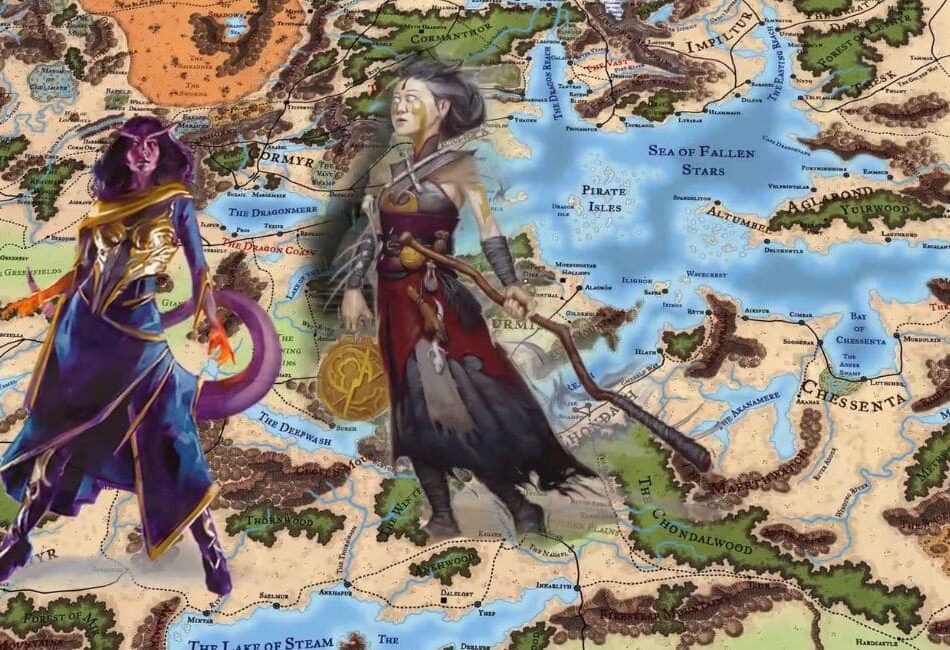I have a soft spot for Tieflings, so they crop up in my homebrew campaigns a lot. That means I’m always having to come up with new Tiefling names, sometimes on the spot, but in my years as a DM, I’ve found some handy sources of inspiration for Tiefling names.
From forming new Tiefling names out of Greek words to taking inspiration from ancient literature and medieval folklore, the best Tieflings names always have a touch of evil about them.
This guide to the best Tiefling names will give you plenty of best Tiefling name ideas and some tips on how to create your own Tiefling name for your next character or NPC.
Bottom Line Up Front: My Favorite Tiefling Names
This article has loads of Tiefling names to choose from, so let’s start off with my personal favorites. As far as I’m concerned, Tiefling names, except Virtue names, should have some link to hell, the underworld, evil, and so on. They are part devil, after all. So here are my top Tiefling names:
- Katara (female) — inspired by the Greek word for ‘curse.’
- Mordai (male) — named after Mordai Vell, a Tiefling from Neverwinter and leader of an Asmodeus-worshiping cult.
- Mayhem (female) — ‘May’ for short, a Tiefling ‘Virtue’ name.
- Temperance (neutral) — another ‘Virtue’ name for a Tiefling striving to reign in their anger.
- Mephis (male) — named after Mephistopheles, a demon from Germanic folklore.
- Hecate (female) — Greek goddess of witches and the underworld.
- Dante (neutral) — Writer of Inferno, an epic medieval poem about a descent to Hell.
Who are Tieflings in DnD 5e?
David Blanc has written up an awesome Tiefling 5e guide, so I’ll keep my intro to Tieflings brief and relevant to players or DMs trying to name their Tiefling PC or NPC.
Tieflings are part human and part infernal, with the Player’s Handbook stating that an ancient pact put the essence of Asmodeus, a.k.a. top devil and ruler of the Nine Hells, into their blood and the blood of all future generations of Tieflings.
Because of their Infernal heritage, Tieflings tend to have Infernal names — names based on the Infernal language and from the Nine Hells. What exactly an ‘Infernal’ name is or the ‘Infernal’ language sounds like isn’t specified in the DnD rulebooks, but based off the Infernal names suggested in the Player’s Handbook, I’ll offer some thoughts and suggestions on creating an Infernal name below.
Beyond this Infernal heritage, the culture and backgrounds of Tieflings in DnD is broad and diverse, so you don’t need to feel boxed in when choosing a character name. Some Tieflings may come from a family of fiend-worshiping warlocks and cultists, while others may be much more integrated into non-Infernal society.
The Best Tiefling Names
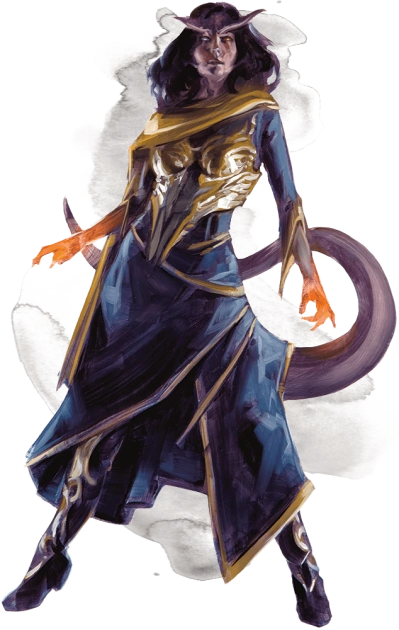
Typical Tiefling names
The Player’s Handbook gives a bunch of suggested Tiefling names on page 43. These names are split into two types: Infernal names and Virtue names. Infernal names tend to be gendered, while Virtue names are gender neutral.
Infernal Tiefling Names
Infernal Tiefling names, such as the ones suggested in the Player’s Handbook, tend to be loosely inspired by Ancient and modern Greek word formation, with some loose inspiration from ancient Hebrew, Samarian, and Aramaic languages. Most male Infernal names end in -os, -on, or -ai, and most female Infernal names end in -a, -eis, or -aia.
Here are some examples, both gathered from the Player’s Handbook and generic lists of Infernal names.
- Male Infernal Names: Aetron, Akmenos, Amnon, Arris, Barakas, Damakos, Ekemon, Horus, Iados, Kairon, Kosrai, Leucis, Melech, Melios, Mordai, Morthos, Pelaios, Siremon, Skamos, Therai, Xarrios.
- Female Infernal Names: Akta, Araneis, Anakis, Bryseis, Criella, Damaia, Ea, Innise, Kallista, Lerissa, Lillaia, Makaria, Nemeia, Orianna, Phelaia, Rieta, Sapione, Sarlia, Velvine.
I guess pseudo-Greek names have a kind of ancient, hellish feel to them?
You can create your own Infernal Tiefling name inspired by Greek by merging an existing Greek word, ideally one with a link to your character or class, with a male Infernal name ending (-os, -on, or -ai) or a female Infernal name ending (-a, eis, aia). Here are some examples for inspiration:
- Thanatos (male) or Thanata (female), from thánatos — the Greek word for death.
- Lepidai (male) or Lepida (female), from lepída — the Greek word for blade.
- Neros (male) or Nereis (female), from neró — the Greek word for water.
- Zestos (male) or Zesta (female), from zestó — the Greek word for hot.
- Kataros (male) or Katara (female), from katára — the Greek word for curse.
Virtue Tiefling Names
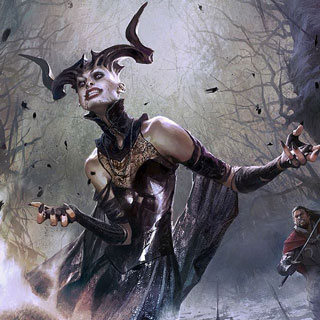
Some Tieflings are given or adopt names that reflect a virtue or other abstract concept, which may or may not be linked to their personality, destiny, or hopes and dreams.
In my current campaign, one of my players is a Tiefling named Promise. This name was given to her by her adopted parents; her ‘real’ name is Amesha. So your Tiefling might similarly have a ‘real’ Infernal name and an adopted Virtue name.
Virtue names are also gender neutral, so while we might associate some like ‘Destiny’ or ‘Faith’ with feminine characters, feel free to get a bit more gender-bendy with your Virtue names.
Tiefling Virtue Names: Bliss, Charity, Cherish, Delight, Destiny, Dread, Endure, Eternal, Euphoria, Faith, Fortune, Harmony, Honor, Hymn, Journey, Lament, Liberty, Mayhem, Promise, Rebel, Relentless, Silence, Temperance, Trouble, Truth, Valor, Vengeance, Weary.
Forgotten Realms Tiefling Names
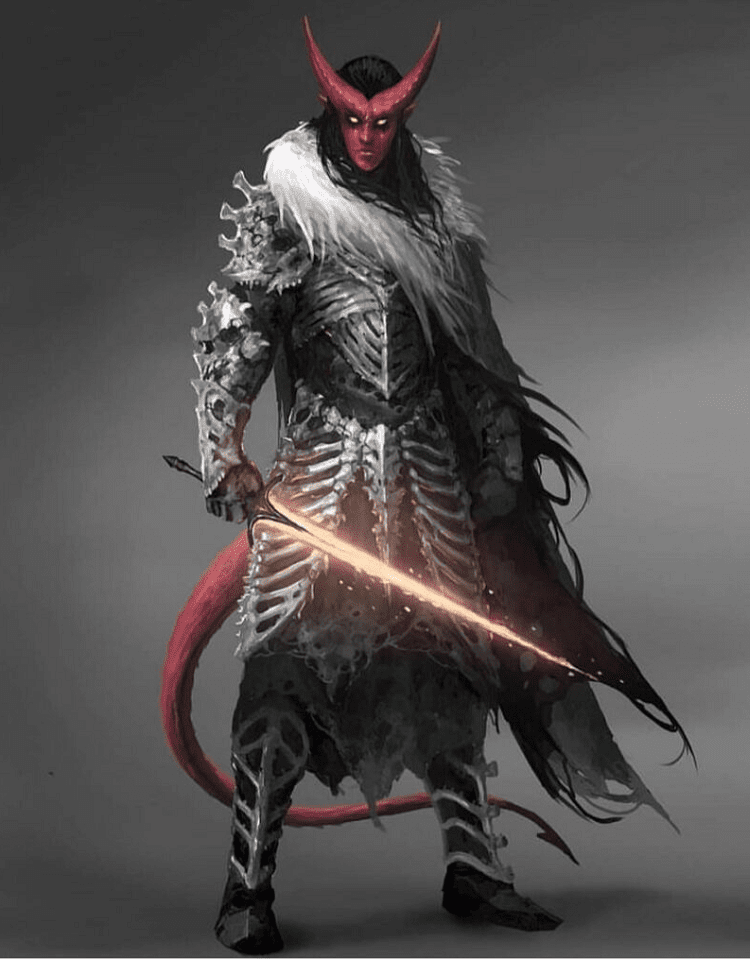
In this history and lore of the Forgotten Realms, there have been plenty of notable Tieflings. You might choose to name your Tiefling after one of them, either because your parents wanted to honor that Tiefling or simply by coincidence because you like the name.
Here are some Forgotten Realms Tiefling names and a bit of backstory.
- Bryseis or Brysera (female) — a Tiefling Warlock and one of the original Tieflings who made a pact with Asmodeus.
- Alyona (female) — Bysera’s twin sister.
- Mordai (male) — A noble from Neverwinter and leader of the Ashmadai, a cult that worshiped Asmodeus.
- Farideh (female) — a Tiefling warlock from Waterdeep and descendant of Bysera who accidentally made a pact with a cambion named Lorcan.
- Havilar (female) — a Tiefling fighter and bounty hunter from Waterdeep and Farideh’s twin sister.
- Makos (male) — A Tiefling warlock lich and one of the heroes of Neverwinter.
- Sylvira (female) — one of the Great Readers of Candlekeep, a powerful archmage and sage.
- Vanifer (female) — A sorcerer and Prophet of Fire and leader of the Cult of the Eternal Flame, a violent cult dedicated to Imix, a primordial fire deity.
Almost all of the famed Tieflings from the Forgotten Realms are female. but any of these names could be ‘masculinized’ by switching out the ending to an -on, -os, or -ai.
Or you might want to base your Tiefling name off of a place, deity, or devil in the Forgotten Realms. If that’s the case, here are some of the best Tiefling names you could opt for:
- Nessus (male) / Nessa (female) — based on Nessus, the deepest layer of the Nine Hells.
- Fiernon (male) / Fierna (female) — based on Fierna, an archdevil who rules over Phlegethos, one of the Nine Hells.
- Nergal (male) / Nergaleis (female) — based on Nergal, an archdevil exiled in Avernus, one of the Nine Hells.
- Styx (neutral) — based on the river Styx, which runs through Stygia, one of the Nine Hells (and is the river in the underworld of Greek Mythology).
Myth and Literature Inspired Tiefling Names
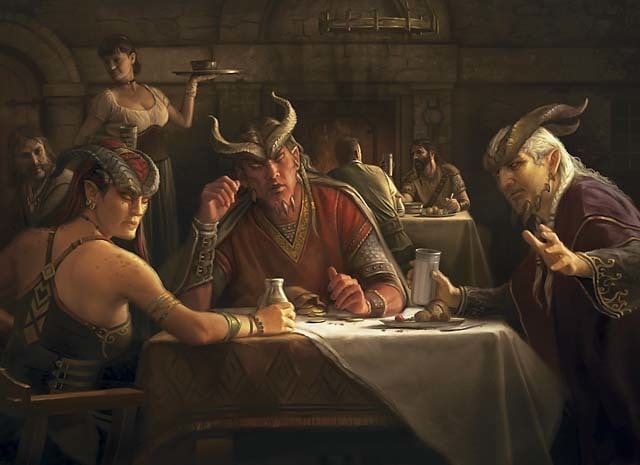
As a DM who regularly draws on myths, legends, and literature as inspiration for character names, I’m very much in favor of making use of myths, folklore, books, TV, and film to name your characters.
Here are some Tiefling names and sources of inspiration you might consider adopting from outside of the Dungeons & Dragons universe.
Greek Mythology
Greek mythology is full of deities, heroes, monsters, and places where you can draw inspiration from for Tiefling characters. My favorite is Hecate, goddess of the underworld and witchcraft, but here are some more ideas:
- Hecate: goddess of the underworld and witchcraft.
- Persephone: goddess of spring and queen of the underworld.
- Acheron: the river of misery running through the underworld.
- Charon: the ferryman who takes souls over the Styx.
- Alecto, Megaera, and Tisiphone: the three Furies, goddesses of the dead and avenging.
- Minos: One of the judges of the dead.
- Nyx: Goddess of night.
- Orpheus: The musician who traveled to the underworld in search of his wife — great for a Tiefling Bard.
- Pandora: The woman who opened the box that let out evil into the world.
Classic Literature
I love drawing on classic literature, especially The Odyssey, in my DnD homebrew campaigns. There are plenty of characters in ancient texts that would make great character names, with Circe, the witch from The Odyssey, being my favorite name for a spell-casting Tiefling. Here’s a full list of name ideas:
- Circe: An enchantress in The Odyssey who turns Odysseus’ crew into pigs.
- Calypso: A nymph in The Odyssey who keeps Odysseus imprisoned on her island for years.
- Amphialus: One of the villainous suitors in The Odyssey who (spoilers!) is killed by Odysseus at the end of the book.
- Antigone: Daughter of Oedipus and the death-obsessed protagonist of Sophocles’ tragedy, Antigone.
- Medea: The murderous wife of Theseus who kills her own children, best known from the play Medea, by Euripides.
- Dido: The queen of Carthage and wife of Aenaes, she appears in many classical texts, most notably Virgil’s Aeneid.
Biblical
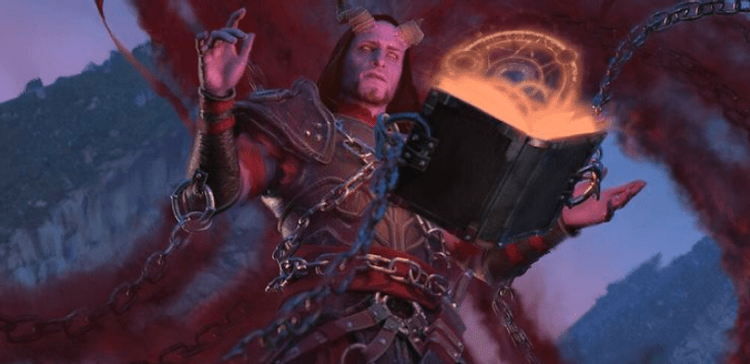
With all the devilish influence on Tieflings, biblical names are also a good route to take when naming your Tiefling — they certainly inspire plenty of names in the Forgotten Realms. Lilith, a demon and in some myths, the first but banished disobedient wife of Adam, is a good choice. Here are some more ‘evil’ biblical names that would make great Tiefling names:
- Lilith: A demon in the Bible, sometimes called Lamia.
- Moloch: A demon or deity associated with idolatry and human sacrifice.
- Delilah: The woman who betrayed Samson and cut off his hair.
- Jezebel: Wife of Ahab, associated with false prophets.
European Folklore and Literature
Here are some names to inspire your Tiefling gathered from European folklore and medieval literature:
- Grendel: One of the main antagonists in the Old English text, Beowulf.
- Mephisto: Inspired by Mephistopheles, a demon who appears in German folklore, most notably the Faust legend.
- Koschei: a.k.a. Koschei the Deathless, an evil spellcaster from Russian folklore.
- Dante: The late medieval/early renaissance writer of Inferno, an epic poem about a descent to Hell.
- Melkor: The godlike antagonist of Tolkien’s The Silmarillion.
- Hastur: A mysterious and ancient god of the Lovecraft universe.
FAQs
Question: How do Tieflings get their names?
Answer: Tieflings get their names at birth. Typically, this is either an Infernal name or a generic name linked to the region they are born in. A Tiefling might adopt a Virtue name later in life and discard or conceal their birth name.
Question: Do Tieflings have last names?
Answer: Yes. Tiefling last names usually either reflect their Infernal heritage or the region they are from, and they get their last name from their parents or kin.
Question: Do Tieflings choose their own names?
Answer: A Tiefling can choose a new name for themselves later in life. This is usually a ‘Virtue’ name, like Temperance, Mayhem, Despair, or Hope.
Conclusion: Naming your Tiefling in DnD
Ultimately, naming your Tiefling in DnD shouldn’t be purely linked to their race. Think about their background, their class, their origins. Virtue names are a fun way to name Tieflings, and there are a ton of virtues and abstract concepts out there to choose from.
If you go down a different route, do some research. If you choose a mythological, biblical, or literary character to name your Tiefling after, look up that character and see how well they reflect who you want your Tiefling to be.
And remember, names don’t determine who we are, so why should they determine your Tiefling? A Tiefling with an Infernal name may be trying to strive towards goodness and light, or a Tiefling wishing to get closer to their devilish roots may try to hide from players that they have a boring real name. Whatever option you choose, think about it carefully. If you’re a player, you’ll be stuck with this name for some time.
- Best Alternatives to Dungeons & Dragons - August 23, 2023
- Wyverns 5e Guide: The Chickens of the Dragon Family - September 5, 2022
- Best DnD Dice Tray Ideas for Players and DMs - August 22, 2022

